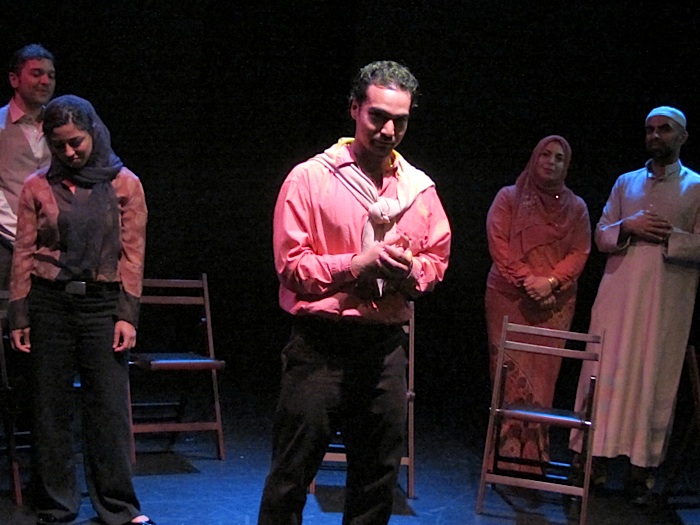Aftermath at Stagewerx attempts to humanize recent refugee experience.
An austere set greets the assembled theater-goers in the black box arena of Stagewerx: a projection of a shop-lined street in the Middle East, a few chairs, an aerial photograph of Iraq perched on an easel, an incongruous television, and a pair of shoes.
A lone figure in a headscarf and wide trousers, Rafidain (Yara Badday), approaches the centerstage and begins to speak in Arabic, offering chai, looking anxiously over her shoulder for her interpreter, Shahid (Mohamed Chakmahchi). In Theatre Period’s ongoing production of Aftermath, the year is 2008, the location is Jordan, and all of the characters are Iraqi refugees, their stories gleaned from a series of interviews conducted by Jessica Blank and Erik Jensen on the subject of the 2003 US invasion and occupation of Iraq, and its ongoing repercussions.
Throughout the course of the play, the individual character traits of the interviewees reveal themselves through text and minimal movement. The independent fierceness of Rafidian, a pharmacist; the brash materialism of action-film aficionado and dermatologist Yassar (Shoresh Alaudini); the righteous anger of Imam Abdul-Aliyy (Munaf Alsafi); the only partially-subdued optimism of a pair of exiled theater artists played by Andrea Ali and Hassan Alnawar.

Facing reality: a scene from Aftermath. Guardian photo by Nicole Gluckstern
A familiar ritual accompanies each introduction, as each character offers tea, coffee, baklava, a peek at the family photo album or a proud pair of diplomas — acts of culturally-ingrained hospitality reminiscent of similar scenes in Joe Sacco’s documentary graphic novel, Palestine.
Since most of the text is in English, the role of the “interpreter,” a composite character created by Blank and Jensen, spends much of his stage time interpreting not language, but rather the timeline and the historical role of tribalism in Iraq for audience edification.
As for the other characters, their discourse is scripted directly from interview material: a Christian woman, Basmina (Jasmin Kimberley Ali) describing the sound of falling bombs, a young couple (Dolfakar Mardan and Susu Attar) struggling with painful nostalgia for the home they built themselves and then had to leave behind, the dignified Abdul-Aliyy elucidating the tortures he survived during his unwarranted incarceration at Abu Ghraib. The play focuses not so much on creating a linear narrative, but on creating awareness that each character is not mere statistical data to collect — they are full-fledged, multifaceted members of the human race.
The production is not without its awkwardness. The material is intense, often discomfiting, and unadorned, mirrored by the minimal staging, stark lighting, and the stilted bearing of a few of the actors, (some of whom have never performed in a play before).
The scenes play out mostly like a televised eyewitness documentary, populated primarily by static talking heads, any intricacies of decor (save the television) left to the audience to visualize on their own. But ultimately with a play like this, the less that detracts from the simple honesty of the stories being told the better. There’s simply no need to dress this production up with stagecraft, the stories are compelling enough on their own.
Aftermath
Through June 30, $25
Stagewerx
446 Valencia, SF

